#coercive societies
Text
Artists are generally soft-spoken persons who are concerned with their inner visions and images. But that is precisely what makes them feared by any coercive society. (...) Forever unsatisfied with the mundane, the apathetic, the conventional, they always push on to newer worlds.
— Rollo May
#quotes#quote#wisdom#lifequotes#light#quoteoftheday#rollo may#arts#artists#inner visions#images#coercive societies#coercion#unconventional#new worlds#creativity#creation#creatives#creative process#expression
6 notes
·
View notes
Text
I was gonna make a joke about how it's weird that wrestlers and pornstars can both make careers out of gay sex but it's weird that people aren't constantly assuming the pornstars aren't gay and then I remembered that they literally are people do that all the fucking time constantly like
Yui Hatano and Hibiki Otsuki are two of the most prolific successful JAV stars of all time and it takes like 4 seconds looking at either of their social medias to find out they spend like 5 days a week together minimum and go on all of their vacations together and like there's documented video evidence of them having insane crazy gay sex with each other across literally dozens if not hundreds of titles. And people will be like "they're best friends :)" Like if one of them was a man people would just call them married, it's fucking insane. Yui Nagase and Ichika Matsumoto, same boat, when Yui retired Ichika produced or directed all like 10 of her retirement road releases and fucked her in half of them and people will be like "so cute that they're besties, they even have a youtube channel together ^-^" I just. Like okay yeah nvm I guess I'm not surprised people assume all wrestlers are straight when the sex is only communicated through violence. That's a whole extra step most people ig aren't even close to ready for
#yeah this can go on main idc any more#it just drives me crazy. Assume more people are gay. The closet is not a privilege or a matter of privacy it is coercive#Consider that maybe the reason someone being outed is negative is not bc being gay is inherently bad but bc of society's reaction to it#and anyway pointing out someone's work is consistently queer isn't even outing them#idk who I'm even getting mad at rn but I'm MAD about it I need to go have a juicebox
116 notes
·
View notes
Text
youtube
Cluster B Society
A strange new pattern of psychological dysfunction has infiltrated our most prestigious institutions, our corporate bureaucracies and the highest offices in the land. In short, we're sick. Our society is out of balance. We've been consumed by a cluster of disorder that appeals to our worst instincts and deranges our most important social functions. We need to recover our sanity, but to do so we must first know exactly what we're dealing with.
-
Today we are witnessing the emergence of something new. What might be called a Cluster B society. Like the culture of narcissism, our own digital age has a distinct psychological profile: heavily influenced by the power of social media; the cameras are always on; an audience is always watching; and narcissism has transformed into hysteria, moral theatrics, emotional volatility, self-indulgence and outbursts of violence.
Psychologists have captured the spirit of our modern culture in four specific psychopathologies that together comprise the Cluster B personality disorders.
Narcissistic Personality Disorder is characterized by a sense of entitlement, of obsession with one's own self-importance and deep feelings of resentment, often expressed through moral self-righteousness.
Borderline Personality Disorder is characterized by an unstable sense of identity, black and white thinking, feelings of emptiness, and recurring self-harm and suicide attempts.
Histrionic Personality Disorder is characterized by excessive emotionality, sexual provocation and attention seeking, often to serve a pathological need for sympathy.
And Anti-Social Personality Disorder is characterized by impulsivity, manipulation, disregard for others and a penchant for violence and aggression that violates social norms.
But this cluster of social pathologies is no longer an individual matter. It has begun to shape the patterns and structures of our entire culture, which is quickly becoming a Cluster B society that replaces disagreement with accusation, uses false compassion to manipulate citizens into compliance, honors victimhood instead of accomplishment, and enforces the whole scheme with the threat of violence.
For most of our history, significant personality disorders were treated as problems and largely relegated to the fringes of society.
But in our emerging Cluster B Society, the narcissist, the borderline, the hysteric and the anti-social psychological types have been elevated into positions of power and celebrated by our institutions. The new status quo is an emerging leadership class that rules through emotional blackmail. Powerful institutions use the cover of various victim groups to impose their agenda on the rest of us. If we dissent, we're branded as hateful bigots, we're accused of lacking empathy, we are ritualistically banished.
While these strategies are contemptible, they're also remarkably effective in controlling what we think, what we say and how we act, and they've slowly transformed our institutions into what psychologist Andre Lobachevski calls "pathocracy," or "rule by psychological dysfunction." This has become our new social order.
If you look around you'll start seeing it everywhere.
==
A coercive-control society.
#Cluster B#cluster b personality disorder#mental illness#histrionic personality disorder#narcissistic personality disorder#antisocial personality disorder#borderline personality disorder#The Cluster B Society#mental health issues#mental health problems#mental health crisis#pathocracy#victimhood culture#victimhood#emotional manipulation#coercive control#Christopher Rufo#narcissism#hysteria#religion is a mental illness
10 notes
·
View notes
Text
Types of Power
Power can manifest in various forms, each influencing individuals and societies in distinct ways. Here are some different types of power:
Coercive Power: Coercive power involves the ability to force compliance or obedience through threats, punishment, or use of force. It relies on fear of negative consequences and is often associated with authoritarian regimes, law enforcement, or military institutions.
Reward Power: Reward power stems from the ability to provide incentives, rewards, or benefits in exchange for compliance or desired behavior. It can involve material rewards such as money, promotions, or privileges, as well as social rewards like praise or recognition.
Legitimate Power: Legitimate power is based on recognized authority, formal roles, or institutional positions within society. It derives from social norms, traditions, or legal structures that confer authority to certain individuals or institutions, such as elected officials, government leaders, or religious figures.
Referent Power: Referent power arises from the attractiveness, charisma, or perceived likability of an individual or group. It is rooted in admiration, identification, or emotional connection with a person or group, leading others to voluntarily align with their values, beliefs, or goals.
Expert Power: Expert power comes from possessing specialized knowledge, skills, or expertise in a particular domain. Individuals or groups with expert power are perceived as credible, trustworthy, and competent, enabling them to influence others through their expertise and insights.
Informational Power: Informational power derives from controlling access to valuable information or resources. Those who possess information that others need or desire can wield influence by selectively sharing or withholding information, shaping perceptions, or guiding decision-making processes.
Connection Power: Connection power is based on social networks, relationships, or alliances with influential individuals or groups. Those who have extensive social connections, networks, or alliances can leverage their relationships to access resources, opportunities, or support, enhancing their influence and status.
Resource Power: Resource power involves control or ownership of valuable resources, assets, or material wealth. Individuals, organizations, or institutions that possess significant resources, such as financial capital, land, or technology, have the ability to influence others through control over vital resources.
Symbolic Power: Symbolic power arises from the ability to shape meanings, values, or cultural norms within society. It is associated with influential figures, institutions, or ideologies that shape collective beliefs, identities, or symbols, influencing how individuals perceive themselves and their social reality.
Relational Power: Relational power emerges from interpersonal relationships, dynamics, or interactions between individuals or groups. It involves the ability to negotiate, persuade, or influence others through communication, trust-building, or emotional connections within social contexts.
These different types of power interact and intersect in complex ways, shaping social hierarchies, organizational dynamics, and individual behaviors within societies.
#philosophy#epistemology#knowledge#learning#chatgpt#education#metaphysics#ethics#psychology#sociology#society#culture#power#Coercive power#Reward power#Legitimate power#Referent power#Expert power#Informational power#Connection power#Resource power#Symbolic power#Relational power
3 notes
·
View notes
Text
.
#just saw someone in the tags on a post about 'neoAGAB' or something similar#(aka. a post where you pull the scooby doo monster hood off its always transandrophobia truthers decrying tme/tma as being the same as agab#say that they dont identify with an agab. like yeah thats the point. it is in fact coercively assigned at birth.#its a material statement about the fucked up society we live in and the way people are violently gendered by it#and the way those genders are enforced and constructed at the expense of intersex people especially
5 notes
·
View notes
Note
hi! what kinda things do you want me to ask about? is it only alpha kids stuff? also do you incorporate quadrants when shipping?
Just whatever! Though I am Always down to talk about the alpha kids (and there’s no guarantee I’ll have anything interesting to say on another topic)
And yeah, while quadrants are not the primary lens I tend to use for relationships i do think abt them? especially for troll characters but they work for humans too
#though i do think quadrants are like. a social construct and can be unhealthy or coercive esp in alternian society#they’re fun shipping frameworks out of universe and useful to some extent but in universe i think it’s worth picking apart a bit more
5 notes
·
View notes
Text
i get a little on my high horse sometimes abt the way in which cishet+ culture will sometimes (usually implicitly) link, hm how to put this, gender hypersaturation with attractiveness—like, dialing up the level of eg Manliness gets framed as inherently also dialing up someone's level of sexiness
this has always seemed totally nuts to me, as someone frequently attracted to very effeminate men+ and very androgynous women+
but i definitely do kind of frame my own self-criticism in terms of like. 'failing at masculine model of attractiveness, failing at feminine model of attractiveness, guess i gotta just go sit by myself in my miserable little mudpit'
which is like. literally what even, self. like. is 'thumbing my nose at all binary standards' not. the nominal objective actually. and yet!!
#anyway like. not sure where i'm going with this but i guess i do want to work on that reflexive feeling of superiority#like. it's difficult to get positive gender affirmation from society at large as any flavor of trans#but there's definitely a particular flavor of difficulty that comes with nonbinary identification#like‚ 'i can't expect you to read my mind so probably just hoping you don't actively gender me in any direction is the best i can hope for'#like sometimes ppl on here will use pronouns for me that feel nice and i like that. special shoutout 2 box on that front.#but anyway basically either i get coercively gendered a binary gender (mostly but not always F)#or i get clear feedback that i'm Failing (to be categorizable which yes is the goal but. emotional experience of Failing still not good)#and just—idk where i'm going with this but i guess i think like. there IS this real desire to be like. a pleasing example of one's genre#and i still kind of think it's weird to conflate what's essentially gender eu-/dysphoria with attractiveness to *others*#but also i think those things ARE weirdly tangled up for a lot of us for whatever reason?? want 2 think abt that more#but want 2 be like. less superior abt it while i'm thinking abt it#bc i just think it's. easy to get reverse snooty when yr not getting any affirmation yrself (is i think where i was trying to go w/ this)#and like. fully understandable but like. how is this feeling i have any different from a cis person wanting the same affirmation#anyway i'm tired and not probably articulating myself that clearly but like. 'more thinking less sneering' good general bywords really#feelingsblogging#the psyche#what is gender we just don't know
16 notes
·
View notes
Text
Can we talk about the fact that so many people in older generations kind of have this habit of just expecting children to magically manifest the skills they themselves were taught how to do? and then shaming them for not knowing how to do the same things they should have been teaching their children?
Like, as I’m entering the adult world I’m learning more and more about necessary faulting skills I should have but don’t because no one ever taught me, and when I ask for help or don’t know how to do something like, say, oiling my car or navigating university systems (seriously, I still barely understand what the hell the credit system is) i just get a bunch of the older adults in my life laughing at how our generation doesn’t even know how to do the basics.
And it’s like, yeah, we’ve got google to help us in a pinch theoretically, but my little brother doesn’t know how to scrub a pan (despite literally teaching himself how to cook and make paper sculptures on his own) and he just gets called stupid for not doing it right when no one ever taught him what the hell brushes he was supposed to use.
There’s this whole game of parents telling their children to do a task they’ve spent years doing every day as second nature, because they’ve forgotten that they had to learn how to do it in the first place.
It’s like yelling at a baby for not being able to walk. Sure almost everyone we know does it every day without thinking, but none of that changes the fact that right now, the baby doesn’t know how!
I don’t know, I’ve been sitting on this thought for a while, but the amount of frustration I get from encountering a new problem I’ve never seen before, and asking someone for help only for them to either a) do it for me or b) tell me to figure it out on my own and then get angry when I don’t do it their way… it weighs on you. Especially when you know this is a skill that will help you and are more than willing to learn.
I don’t know, maybe it’s just one more thing for me to get pissed at boomers at. They complain so much about kids not knowing how to do stuff for themselves into adulthood when they were the ones who never bothered to teach them how.
#gen z stuff#millennials#also the whole thing with the iPads isn’t helping#especially since companies have admitted to targeting children and making shit as addictive as possible#one again highlighting just how much we’ve cultivated at society of caring about the short term benefits for the self#rather than thinking about helping people or long term benefits#or I don’t know#working to leave the world a better place than we found it#just a thought#and don’t even get me started on companies using coercive control to make people dependent on expensive items#is this preachy?#probably#am I saying this right?#almost definitely not#but there
0 notes
Text
Psychology tidbit of the day
Social influence and power are categorized as:
- coercive: influencer has control over punishment
- reward: influencer has control over rewards or resources
- expert: influencer is believed to have superior ability, skills, or influence
- referent: target person is attracted to, likes, or identifies with influencer
- legitimate: target person believes influencer has legitimate authority
- informational: influencer possesses specific information needed by the target person
What I found super fascinating was how each of my relationships line up with this. Friends, husband, parents, in-laws, etc. Accepting influence from another person is a way to create more connection. When I think about how often I feel disconnected and which ways I allow myself to accept influence, it creates a really interesting picture
#social psychology#power dynamics#i utterly refuse influence that's coercive or rewarding#which makes functioning in a capitalistic society awkward#most of the influence i accept is referent#which tracks with my slightly waffley sense of self#licensing exam in 49 days#tidbits from studying
1 note
·
View note
Text
In a piece for The New Inquiry from back in 2017, George Dust states that when queer people complain about there being a top shortage, what they really mean is “nobody is fucking me the way I want, and I have no agency in that.” Alongside co-authors Billy-Ray Belcourt and Kay Gabriel, Dust suggests that many queer people align themselves with a passive or “bottom” position because they believe that role will absolve them of the guilt of really wanting things. They present themselves as what they believe to be the sexual party with zero power; the receiver, the accepter of action rather than its cause.
This position is drawn in contrast to the bottom-identified person’s idea of a top: the one who approaches, the person with hungers and desires, the person who decides which sexual activities will happen and how intense they will get. The top, from this perspective, is the stronger, more capable, more dangerous person. They’re the only one who can ever be guilty of intruding or harming somebody else. This power is scary, but it’s also compelling.
Dust calls this fantastical version of a top a “brute” — and they are the most cartoonish stereotype of what it means in society to be a man. Because it’s a cartoonish stereotype, no human actually lives up to it — and we’d probably revile a person even if they could.
Though queer people know we are harmed by the gender binary and heteronormativity and all the social scripts those things force upon us, its biases are still embossed on our brains. Without meaning to, we reproduce tired gender stereotypes in our relationships. And so we see expressing a sexual want as masculine, and being masculine as being more capable of violence and coercive control, and thus bad. We see failing to communicate one’s desires openly as desirably feminine, as well as a sign of blamelessness and purity — because on some level we still feel it is wrong to have desires.
But this entire worldview is a complete lie. Desire is not evil. Expressing attraction is not a violation. Failing to express oneself can be just as dangerous as not listening to someone else’s limits. Women can be abusive. Bottoms can sexually assault. No matter our gender, presentation, or sexual role, we are each capable of harm. And the only way to make a safe, mutually pleasurable sexual encounter happen is by going after it, actively, and communicating from a position of inner strength.
So how do you do that, if society’s been telling you all your life that you’re meant to date by acting like a deer passively snapping twigs in the woods, waiting for some hunter to hear you, and pursue you? (That really is dating advice that Evangelical Christian counselors give to women, if you can believe it).
By not fixating so much on what you’re doing or not doing to draw other people toward you, and instead thinking in terms of what you want and what you observe beyond yourself.
13K notes
·
View notes
Text
prefacing this by saying that swapping "my therapist from hell" stories amongst other psychiatrised and formerly psychiatrised people is cathartic, solidarity-building, and sometimes a great starting point for a politics of mad liberation & i don't resent it at all. however the fact that any criticism of therapy will be met by its defenders with responses that boil down to "find a different therapist :)" is deeply infuriating and missing the point. i am familiar with how wrong-headed and openly prejudiced individual therapists can be, but the bigger & more fundamental issue is that a 'well-trained' therapist, practicing according to best & most current professional norms, is explicitly a person whose job is to convert distressed people into 'functioning', 'productive' (read: profit-generating) members of 'society' (read: hegemonic cultural norms & forms) & to shunt any 'patients' who fail at this task of 'getting better' into traumatising institutions where more authoritarian and coercive measures can be implemented. it does not actually matter if you, personally, had a super nice therapist who did not do this or believe these things. like, i'm happy for you but this is a structural critique of a profession & its relationship to state power.
4K notes
·
View notes
Text
for a few years now (like since at least 2021) i’ve been occasionally seeing isolated individuals try on “AFAB trans woman”, “AFAB transfem”, “AMAB trans man”, “AMAB transmasc” and dreading the possibility of this becoming an inclus/exclus thing where there’s a huge vicious debate and a ton of people develop calcified stances that it’s “valid” because they are straight ticket voters on uses of language being “valid”. i’ve recently come across multiple fairly high-note promotions of each of 1) yeah, sure, anyone can be a trans woman (normal understanding of the language of AGAB, replaces meaning of “trans woman” with “someone who is a woman and also trans” or, worse “someone who identifies with the vibe of trans womanhood”) and 2) your AGAB is whatever you decide it is, maybe even a neolabel (completely opposite the concept of gender assignment at birth). i’m crossing my fingers that these uses somehow go no further, or that if they do the ensuing fight blows over quickly.
as an individual topic, it’s frustrating because it points to the complete failure on a lot of people’s parts to absorb or understand the basic premises of this idea of transgender.
we live in a world where, when humans are born, the adults around them decide what role they are going to have in a system of male/female boy/girl man/woman. usually they pick based on a quick look at the child’s external genitalia. if the quick look doesn’t match their idea of what a baby boy or baby girl is supposed to look like, they might or might not do further physical investigation, and either way they will pick a role for the child. if the child doesn’t look one of the ways expected, they might enforce this decision through surgery to conform the child’s body to their ideal for the role they chose. whether the decision was immediate or after deliberation, whether surgery was performed or not performed, this process of role picking is coercive. a first act of coercion in a childhood of coercion in a lifetime of coercion.
children are raised to the roles they were assigned. sometimes this involves the deliberate imposition of a lot of restrictions and expectations about how the child will look and behave, sometimes fewer, sometimes almost none but that they will agree that they are what the adults said they were. even if it is only the last, the child will sooner or later feel the weight of much greater expectations, because they will become aware that wider society says girls should look girly and do girl things and boys should look boyish and do boy things. sometimes it becomes apparent that a child’s body is growing to not match the adults’ idea of what a male body or a female body is supposed to look like or do. if this happens, the adults might allow or force the child to switch roles, might ease or double down on their expectations, and might or might not give the child a choice in whether they biomedically intervene in the child’s physical development.
sometimes, a person grows to refuse the role they were assigned and adopt a new one. sometimes they only refuse the role they were assigned. sometimes they only adopt a new one. sometimes they only refuse the expectations and restrictions. sometimes they refuse being a boy-male-man or girl-female-woman. sometimes they first do this as a child, sometimes as an adolescent, sometimes as an adult. sometimes they conform to the expectations and restrictions for the role they adopt on purpose, other times less so, other times not at all. sometimes they seek to change their body. rejecting one’s assigned role is an opportunity to escape the pain of the old coercion and find new joys in new, chosen ways of being.
to adopt a new role is simultaneously to adopt that role and to adopt the social position of a role-adopter and the social position of one-who-has-moved-from-that-role-to-this-role. these social positions come with expectations and restrictions in addition to the ones associated with the role adopted. having rejected the assigned role, more possibilities are available to a person. there is a great deal of free choice available for those who are willing to make it. sometimes there are special roles that are never assigned at birth and can only be taken on by someone conscious enough to choose.
gender assignment at birth isn’t an identity, it’s an act of coercion. trans womanhood isn’t a feeling, it’s a particular confluence of adoption and abandonment in a social system premised on gender assignment.
the prospect of discourse fights over “AFAB trans girls” and etc. is unpleasant because they’ll suck super bad and exhaust tons of people for nothing, but more present and disturbing is this even being an issue. understanding the nature of gender assignment is such a keystone in trans theory that i genuinely do not know what models of transness people are functioning on without it.
1K notes
·
View notes
Text
so blatantly obvious that people really think that suggesting someone is a trans woman is literally "forcing" something on them like they will make up all these fucking batshit scenarios to justify thinking that a trans woman who does this is being coercive somehow lmao. as if we ourselves aren't the ones society is trying to coerce into not being trans women
782 notes
·
View notes
Text
How the kleptocrats and oligarchs hunt civil society groups to the ends of the Earth

It's a great time to be an oligarch! If you have accumulated a great fortune and wish to put whatever great crime lies behind it behind you, there is an army of fixers, lickspittles, thugs, reputation-launderers, procurers, henchmen, and other enablers who have turnkey solutions for laundering your reputation and keeping the unwashed from building a guillotine outside the gates of your compound.
The field of International Relations has studied the enemies of the Klept in detail: the Transnational Activist Network is a well-documented phenomenon. But far more poorly understood is the Transnational Uncivil Society Network, who will polish any turd of sufficient wealth to a high, professional gloss.
These TUSNs are the subject of a new, timely scholarly paper by Alexander Cooley, John Heathershaw and Ricard Soares de Oliveira: "Transnational Uncivil Society Networks: kleptocracy’s global fightback against liberal activism," published in last month's European Journal of International Relations:
https://ora.ox.ac.uk/objects/uuid:5e5a3052-c693-4991-a7cc-bc2b47134467/download_file?file_format=application%2Fpdf&safe_filename=Cooley_et_al_2023_transnational_uncivil_society.pdf&type_of_work=Journal+article
The authors document how a collection of institutions – some coercive, others organized around good works – allow kleptocrats to take power, keep power, and use power. This includes "wealth managers, company providers, accounting firms, and international bankers" who create the complex financial structures that obscure the klept's wealth. It also includes "second citizenship managers and lawyers" that facilitate the klept's transnational nature, both to provide access to un-looted, prosperous places to visit, and boltholes to escape to in the face of coup or reform. It includes the real-estate brokers and other asset facilitators, who turn whole precincts of the world's greatest cities into empty safe-deposit boxes in the sky, while ensuring that footlose criminal elites always have a penthouse to perch in when they take a break from the desiccated husks they've drained dry back home.
Of course, it also includes the PR managers and philanthropic ventures that allow the klept to launder their reputation, to make themselves synonymous with good deeds rather than mass murder. Think here of how the Sacklers used charity to turn their family name into a synonym for culture and fine art, rather than death by opioid overdose:
https://pluralistic.net/2023/08/11/justice-delayed/#justice-redeemed
Beyond providing comfort to "Politically Exposed Persons" and "High Net-Worth Individuals," TUSNs are concerned with neutralizing TANs. Activists in these transnational networks play an inside-outside game: in-country activists will recruit peers abroad to bring attention to the crimes of their local kleptocrats. These overseas partners target the klept in the places they go to play and spend, spoiling their fun – and if they succeed in getting corrupt leaders censured abroad, then in-country activists can leverage that bad press to fight the klept at home.
To fight this "Boomerang Effect," TUSNs seek to burnish corrupt officials' reputations abroad, getting their names on humanitarian prizes, beloved sports teams, cultural institutions and great universities. They seek to capture international governance institutions that might wrong-foot kleptocrats, co-opting them to enable and even celebrate looters.
When it comes to elite philanthropy, TUSNs are necessarily selective. Kleptocrats' foundations don't fund anti-kleptocratic groups – they stick to "education, public health, the environment and the arts." These domains steer clear of human rights questions that might implicate their benefactors. Russian oligarchs love children's charities and disability rights – provided they don't target the Russian state.
If charitable giving is reputation laundering's carrot, then "reputation management" is the laundry's stick. Think of organized copyfraudsters who clone websites that have criticized their clients, then backdate the articles, then accuse the originals of infringing copyright in order to get them de-listed from Google or taken offline altogether:
https://pluralistic.net/2021/04/23/reputation-laundry/#dark-ops
Reputation managers also spend a lot of time in court. In the UK – the world's leader in libel tourism, thanks to a legal system designed to let posh monsters sue muckraking journalists into silence – Russian oligarchs have perfected the art of forcing their critics to shut up and go away:
https://pluralistic.net/2022/03/04/londongrad/#enablers
Indeed, London is a one-stop shop for the global klept, a place were forelock-tugging Renfields will buy you a Mayfair mansion under cover of a numbered company, sue your critics into silence, funnel your money into an anonymous Channel Islands account:
https://pluralistic.net/2022/01/07/the-klept/#pep
They'll sell you whole galleriesworth of "fine art" that you can have relocated to a climate-controlled container in a Swiss or Irish freeport:
https://pluralistic.net/2020/07/14/poesy-the-monster-slayer/#moneylab
They'll give your thick-as-pigshit progeny a PhD and never check to see whether he wrote his thesis himself:
https://en.wikipedia.org/wiki/LSE%E2%80%93Gaddafi_affair
Then they'll hook you up with a cyber-arms dealer to hunt your enemies by capturing their devices:
https://pluralistic.net/2021/07/27/gas-on-the-fire/#a-safe-place-for-dangerous-ideas
But don't let Brexit stop you from shopping for bargains on the continent. The Golden Passports of the EU – available in a variety of flavors, from Maltese to Cypriot to Portuguese – offer the discerning failson access to the luxury good shops and fleshpots of 27 advanced economies, making it a favorite of the Khmer Riche – the junior klept of Cambodia's ruling faction:
https://www.reuters.com/investigates/special-report/cambodia-hunsen-wealth/
But golden passports are for amateurs. Skilled klepts travel on diplomatic passports, which offer the twin benefits of free movement and consequence-free criminality, thanks to diplomatic immunity. The former Kazakh dictator's son-in-law enjoyed a freewheeling diplomatic life in Vienna; one daughters of the dictator of Tajikistan had a jolly time as an envoy to DC; another, to London (where else?).
All this globetrotting serves a second purpose: when rival elites seize power back home and force the old guard into exile, those ex-monsters can show up in the lands they called their second homes and apply for asylum. It turns out that even bomb-the-boats UK will welcome any asylum seeker who enters via the private jet terminal at City Airport (to be fair, these "refugees" have extensive properties in Zone 1 and country places in the Home Counties, so they won't need housing).
This stuff works. After Kazakh state goons murdered at least 14 protesters at a Zhanaozen oil facility in 2011, human rights groups around the world took up the cause. But they were effectively neutralized by TUSNs, with former UK PM Tony Blair writing on behalf of the Kazakh government to the EU condemning any kind of international investigation into the mass killings (add "former Prime Ministers" to the list of commodities for sale in the UK to sufficiently well-resourced murderer).
The authors close their paper with two case-studies. The first is of the daughters of Uzbek dictator Islam Karimov, Gulnara and Lola. And President Karimov was indeed a dictator: he trapped his population within his borders, forced them to use unconvertible scrip in place of money, and ordered the murder of hundreds of peaceful protesters, plunging the country into international isolation.
But while Uzbeks were sealed within their borders, Gulnara Karimov became an international player, running a complex network of businesses that mixed the products of the nation's oilfields with her family's fortune. She solicited – and received – bribes from Teliasonera, MTS and Vimpelcom, who were all vying for the contract to provide service in Uzbekistan. All told, she extracted more than $1b in bribes, laundering them through Latvia, Hong Kong and New York. She acquired real-estate in France and Switzerland, and her spree continued until her father collaborated with Uzbek security to seize her assets and place her under house-arrest.
Lola Karimova-Tillyaeva was Gulnara's estranged younger sister. She and her husband Timur Tillyaev ran the Dubai-based SecureTrade, which did extensive business with "opaque Scottish Limited Partnerships," laundering more than $127m in a single year to offshore accounts in the UAE and Switzerland. They acquired many luxe assets – a jet, a Californian villa, and an LA perfumier.
Lola styled herself as the face of the Karimovas abroad, a "philanthropist and cultural ambassador." She was a UNESCO ambassador and commissioned works of monumental art – and also sued the shit out of news outlets that reported factual matters about her family repressive activity at home. She organized AIDS charities in the name of Uzbekistan – even as her father was imprisoning a writer for publishing a book explaining how to have safer sex.
The second case-study is on Isabel dos Santos, "Africa's richest woman," daughter of Angolan dictator Jose Eduardo dos Santos. Isabel's vast fortune stemmed from her personal capture of vast swathes of the third-largest economy in Africa: "telecommunications, banking, diamonds, real estate and cement, among many others." Isabel enjoyed seemingly limitless access to state credit and co-investment, and was given first crack at newly deregulated industries. Foreign firms that invested in Angola were required to "partner" with Isabel's businesses.
Isabel claimed to be a "self-made woman" – a claim credulously parroted by the western press, including the FT. She used her homegrown fortune to become a major player abroad, especially in Portugal, where she was represented by the leading Portuguese law-firm PLMJ. Her enablers are who's who of corruption-loving lickspittles: McKinsey, Ernst and Young, Boston Consulting Group, and the Spanish BigLaw firm Uri Menendez.
Isabel cultivated a public facade of philanthropic giving and public spirited activism, serving as head of the Angolan Red Cross. She attended Davos and spoke at the LSE (she was also invited to Oxford, but her invitation was subsequently rescinded). On social media, she dismissed critics of her wealth and corruption as "colonialists," decrying their "racism" and "prejudice."
Isabel dos Santos's corrupt sources of wealth were finally, irrefutably exposed through the Luanda Leaks, in which the International Consortium of Investigative Journalists mapped the network of "top banks, management consultants and legal firms that were central to dos Santos’s operations."
Both case studies shed light on the network of brilliant, driven enablers and procurers without whom the world's greatest monsters would falter. It's a rare window on a secretive world, one that is poorly understood even by its inhabitants. As Michael Mechanic wrote in Jackpot, his 2021 book on vast, intergenerational fortunes, the winners of the lucky orifice lottery often lack any real understanding of how The Money is structured, grown and protected:
https://pluralistic.net/2021/04/13/public-interest-pharma/#affluenza
This point was reiterated by Abigail Disney, in a brave piece on what it's like to grow up subject to the oversight of these millionaires who babysit the children of billionaires:
https://pluralistic.net/2021/06/19/dynastic-wealth/#caste
This is an important contribution to the literature. We naturally focus on the ultrawealthy individuals whose reputations and fortunes are the subject of so much attention, but without the TUSNs, they would be largely helpless.

Going to Burning Man? Catch me on Tuesday at 2:40pm on the Center Camp Stage for a talk about enshittification and how to reverse it; on Wednesday at noon, I'm hosting Dr Patrick Ball at Liminal Labs (6:15/F) for a talk on using statistics to prove high-level culpability in the recruitment of child soldiers.
On September 6 at 7pm, I'll be hosting Naomi Klein at the LA Public Library for the launch of Doppelganger.
On September 12 at 7pm, I'll be at Toronto's Another Story Bookshop with my new book The Internet Con: How to Seize the Means of Computation.

If you'd like an essay-formatted version of this post to read or share, here's a link to it on pluralistic.net, my surveillance-free, ad-free, tracker-free blog:
https://pluralistic.net/2023/08/24/launderers-enforcers-bagmen/#procurers

Image:
Sam Valadi (modified)
https://www.flickr.com/photos/132084522@N05/17086570218/
CC BY 2.0:
https://creativecommons.org/licenses/by/2.0/
--
Colin (modified)
https://commons.wikimedia.org/wiki/File:Palace_of_Westminster_from_the_dome_on_Methodist_Central_Hall_(cropped).jpg
CC BY-SA 4.0
https://creativecommons.org/licenses/by-sa/4.0/deed.en
#international relations#ir#enablers#consiglieri#lickspittles#plutes#guillotine watch#politically exposed persons#peps#high net work individuals#hnwis#oligarchs#reputation laundering#spyware#renfields#big law#uk#kleptocrats#transnational activist networks#tans#civil society#ngos#transnational uncivil society networks#tusns#slapps#Uzbekistan#Gulnara Karimova#Isabel dos Santos#angola#corruption
2K notes
·
View notes
Text
Social Issues that Help with Understanding Buddy Daddies
Here are some political, social, and cultural aspects of Japanese culture that I think is important to keep in mind when watching Buddy Daddies. Please note: this is a super long post, with lots of pictures.
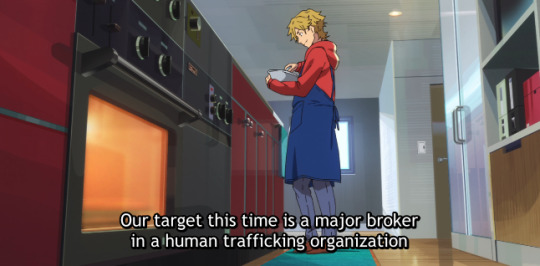
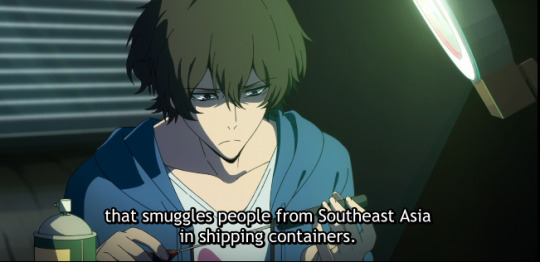
1. Human Trafficking - Slave Labor
In Episode One, we learn that Miri’s birth father was involved in labor based human trafficking involving Southeast Asian individuals. This is currently a very big issue in Japan, since Southeast Asian immigrants (among others) are viewed as a cheap labor option and usually experience slave labor like conditions.
From The United States Department of State website:
Men, women, and children from Northeast Asia, Southeast Asia, South Asia, Latin America, and Africa travel to Japan for employment or fraudulent marriage and are subjected to sex trafficking. Traffickers use fraudulent marriages between foreign women and Japanese men to facilitate the entry of women into Japan for sex trafficking in bars, clubs, brothels, and massage parlors. Traffickers keep victims in forced labor or commercial sex using debt-based coercion, threats of violence or deportation, blackmail, confiscation of passports and other documents, and other psychologically coercive methods.
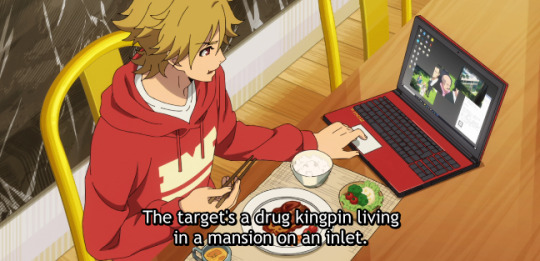
2. Drugs in Japan
When I was living and working as an ALT in Japan, two ALTs (in a different district, but within the same company of my own), got caught with drugs. It was a big deal and ended up in the newspapers. The company I worked for had to do a lot of PR work with the elementary and junior high schools that they had contracts with, to ensure that the contracts would remain. As for me and the other ALTs? We had to sit through like five separate meetings within like two months about drugs and drug laws in Japan.
The barebones takeaway is that, in Japan, weed is viewed as being on the same level as hardcore drugs. Charges can be steep and strict. Even just knowing that someone has drugs, and you don’t say anything to law enforcement about it, can get you in trouble. There is a grey area with drugs, which is stuff like bath salts and the like. Since the selling of things like that cannot be prohibited, so they are easily accessible to the public.
Japan still has a very “90′s D.A.R.E.” approach to drugs. It’s catchphrase is 「ダメ。ゼッタイ。」or “No! Never.”

(Image from a Web Magazine called Nagasaki Press.)
When celebrities are caught with (what’s usually) weed, it can basically be the end of their careers, since recreational drug use of any kind (excluding alcohol, of course), is still negatively looked down upon in Japanese society. This is why it is still heavily left in the hands of the yakuza and drug kingpins, etc. Though there has been a recent increase in protests and ideology surrounding the idea of legalizing weed. Still, not much acceptance for recreational use is likely to come yet. However...
There may soon be some revision to the laws, which will allow for medical use:
Legislation changes scheduled for 2023
In 2021, the MHLW established an expert committee to review the Cannabis Control Act, and it is expected revisions will be proposed in a bill to be submitted in 2023. This will most likely allow for the use of medical cannabis. 2022/12/02
From: Euromonitor
So, something to keep in mind when Kazuki talks about a drug kingpin here is that this drug kingpin is likely not just dealing with super, hardcore drugs, but also softer ones too, like weed.
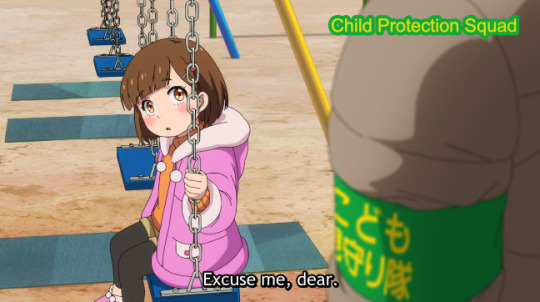
3. Child Protection Squad
There is this misconception in Japan that really young kids, like Miri’s age, can just roam free all around Japan and no one will find it odd. In Episode 1, we do see Miri roaming around the city without anyone really taking notice, but she also wasn’t in an area where there would be people that are trained to take notice.
In the above image she is at a park, which is likely close to a school somewhere. The man that approaches her here has a band around his jacket sleeve that says こども見守り隊 (kodomo mimamori-tai), which gets translated to “Child Protection Squad.” Basically, these are like crossing guards, in a way, because they do play a similar role to that, but they also do more than that as well:
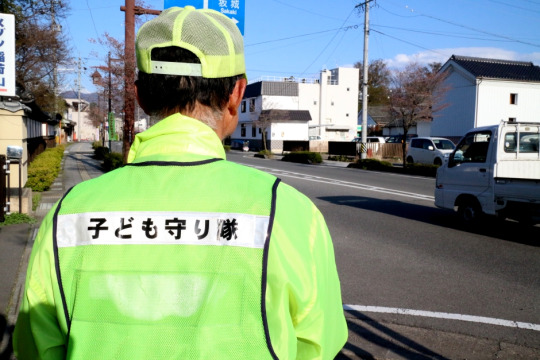
(Image from the Japanese website: Nice Senior).
This people basically ensure that kids stay on the right paths on their way to school. Most of the time, when elementary school children head off to school, they will go in groups (with the 5th or 6th graders being the leaders) and there will often be older people outside their houses on their way in, keeping an eye on the children to make sure they get to school okay.
And that’s talking about elementary school aged kids. For ones that are around Miri’s age, usually the parents (mostly mothers) will bring them by bike:

Or they will get picked up by a bus:

This one looks pretty boring in comparison to some others you might see though, like these:

(Image from the Hiyoshidai School Website)
Sometimes the daycare workers will also take them on little excursions outside using big strollers for the kids to travel around in:

(The image is obviously from a stock photo site called fotostock, but yeah, I’ve seen these before when I lived in Japan).
But a little toddler just sitting on her own at a mostly empty park with just a guy sitting at a park bench nearby watching her? That would raise attention and an eyebrow from someone who is essentially a crossing guard and whose job is to ensure the safety of kids as they travel to and from school.
The rest is under a Read More.

4. Police in Japan
I saw a comment somewhere (maybe it was over on Youtube) about how the cops are portrayed here in Buddy Daddies. The comment was basically that Japanese cops wouldn’t be that aggressive with a child. But, well, cops in Japan have issues like everywhere. Though, the main issue with cops recently has more so been with racial profiling:
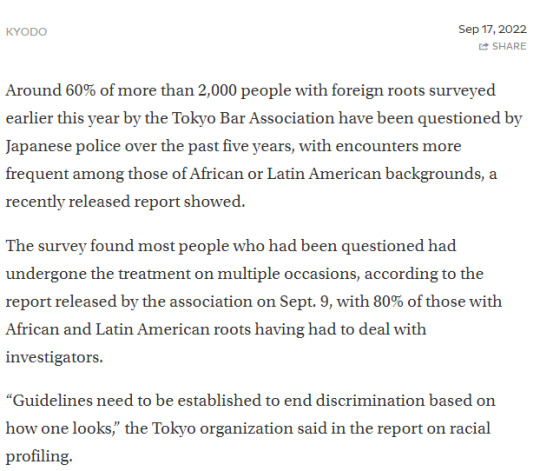
(Excerpt is from a Japan Times article entitled: 60% of people with foreign roots questioned by Japanese police, survey finds).
Of course, this situation is different from the one we see happening with Miri, but the Japanese police have issues with corruption too. So this happening wouldn’t seem too out of the realm of possibilities to me. The anime Tiger & Bunny 2 Part 2 also recently had some moments in the season where there was some anti-cop (ACAB-type) sentiments expressed by a character (though that series is also meant to take place in a city based on NYC).
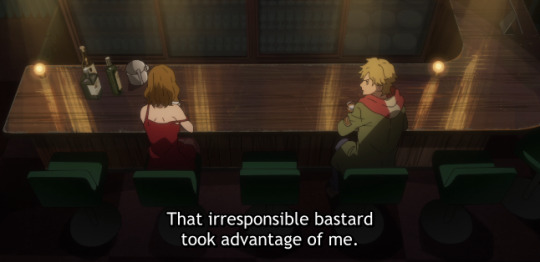
5. Issues Surrounding Reproductive Rights, Contraception, and Abortion
“Took advantage of me” is fairly vague wording, but considering the type of guy he was, and the fact that Miri’s mother is caught in another abusive relationship, it wouldn’t surprise me if Miri’s conception wasn’t fully consensual one. People like to talk about how safe Japan is, but Japan has a lot of sexual violence that goes unreported:
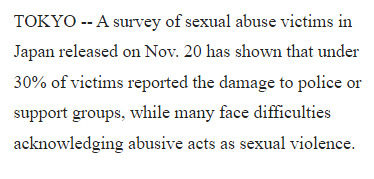
(From an article entitled: Many sexual violence victims in Japan do not report assaults to police, support groups: survey - The article was posted on November 24, 2020 over on The Mainichi news website).
There is a lot of societal pressure in Japan, that can cause a lot of judgement as well. Especially around issues of reproductive rights. From a Japan Times articles entitled: Pandemic provides an opportunity to improve access to contraception, posted on January 30th, 2022, we can get a little insight into the issues surrounding contraceptives:
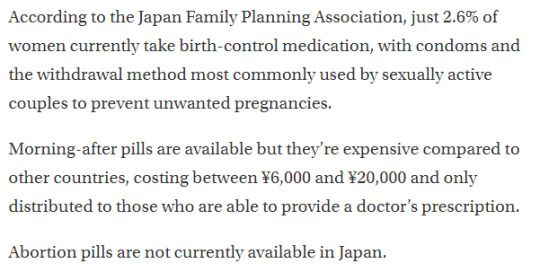
The article also talked about the judgement that can come with contraceptives. The last line also talks about abortion, which comes with its own set of issues in Japan:

(From The Japan Times article: Abortion legal and apolitical in Japan, but cost and consent present barriers)
So abortion was likely an option that Miri’s mother didn’t think was really viable, especially in her situation.
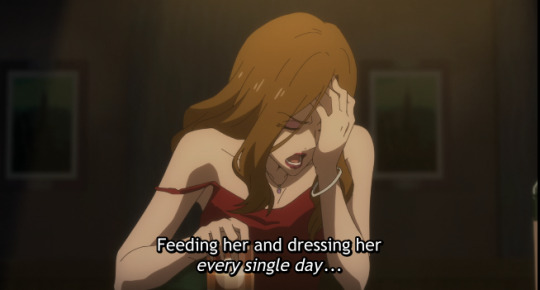
7. Being a Single Mother in Japan, Adoption
In Ep.3 we hear Kazuki parroting a lot of the stuff you usually hear when it comes to women in children, like it is meant to be a natural and innate thing. There is a societal pressure for a woman to give birth and care for the child, even when they aren’t in the best situations to do so. Miri’s mother was, for all intents and purposes, a single mother. Since I doubt the abusive man she is currently with had any hand in helping Miri.
Being a single mother anywhere can be a big challenge, but especially so in Japan. Some issues that single mother’s face in Japan, according to the article “Why Most Families with Single Mothers in Japan are Living in Poverty” from a site called The Borgen Project:
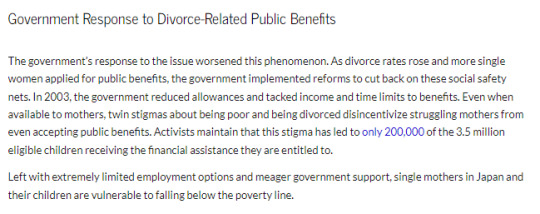
From that same article, we learn that joint-custody and child support doesn’t exist in Japan. So Miri’s mother was likely under a lot of societal and financial stress, along with possible Post-Partum Depression, and (also probable) burnout. This doesn’t mean that her behavior or attitudes are okay, but that they are likely a result of a failed system.
I’ve seen some people bring up adoption, but adoption doesn’t automatically mean that a child will have a better life either. My grandfather’s mother was force to give her children up to the state, so my grandfather spent a good chunk of his life in an orphanage. It wasn’t a pleasant experience. And the probability that Miri would have been adopted had her mother gone through the actual system is, sadly, extremely low. From an article entitled: “The state of orphans in Japan and how to help” found on the site Zenbird.Media is this bit of information:

And even if Miri had been in an orphanage, Misaki (Miri’s mother) would still be her legal guardian.

So an option like that would be unappealing for Misaki, because she doesn’t want anything to do with Miri.

7. LGBT+ Individuals Being Viewed as “Not Productive”
Finally, we have the last thing I briefly want to talk about. The main backbone of Buddy Daddies, which is these two hitmen taking care of a child. Last year, a Japanese politician was in the news because she retracted some previous statements she made in 2016 and 2018. We are going to focus on her 2018 statements, which were:

Her comment received a lot of backlash and was big news. Her retracting her statements also brought a lot of news and talk too. The above information comes from The Japan Times article: “ Japanese lawmaker retracts past remarks on LGBTQ and other minorities.” Her other comments are awful too, but it should be noted that her one about sexual-minority couples stems from the issue of Japan’s declining birthrate. Even though many people in Japan are supportive of LGBT+ rights, there are people that hold a similar viewpoint as this.
Buddy Daddies is pretty directly challenging this ideology, especially with how they have been handling things. So that’s pretty cool and revolutionary in its own way. It makes me interested in seeing how this continued topic as well as any future social issue topics will be handled or touched upon in Buddy Daddies.
If you read this all until the end: thank you so much! I put a lot of work into this write up and I hope it can help (I learned some things too while researching!).
#Buddy Daddies#Kazuki Kusuru#Rei Suwa#Miri Unasaka#Misaki Unasaka#social issues in Japan#long post#meta post#image heavy post
4K notes
·
View notes
Text
Beira’s Place: Thousands helped by Edinburgh rape centre set up by JK Rowling
A year on from the opening of JK Rowling’s women-only rape centre, thousands of victims have reached out for help.
A veteran of more than four decades protecting and sheltering women suffering sexual violence and domestic abuse, Isabelle Kerr was so passionate about supporting JK Rowling’s decision to fund a women-only centre that she came out of retirement to help set it up.
Speaking for the first time since Beira’s Place opened, Isabelle, 67, said: “The whole ethos of the place took me back to the grassroots of the women’s movement in Scotland, when women helped other women stay safe in an act of basic feminism.
“It was how women dealt with the practicalities brought about by the age-old problem of domestic abuse and sexual violence. I’m saddened to say very little has changed through the decades, which is why Beira’s Place has been busy from the moment we opened our doors.”
Isabelle said: “Men’s violence towards women continues unabated around the world. Justice systems continue to fail women with sentencing that rarely reflects the damage and trauma inflicted, despite these crimes carrying the possibility of a life sentence.
“We still have a culture where victims are blamed because of what they wear, where they went or what they did rather than holding the perpetrator to blame. It’s soul destroying.”
“Our phones started ringing the day we opened. They haven’t stopped. We’ve helped almost 2,000 callers looking for support. Over 250 survivors have used our safe space. Many told us they would not want to use the service if men were on the premises, either because they have been so traumatised or for cultural reasons.
Isabelle warns that much more needs to be done about identifying the escalating cycle of violence towards women. She said: “We don’t live in the kind of society where women and girls are safe from predators, stalkers, rapists and men who use coercive control to trap the vulnerable. We live in a society where women and girls have lost so much trust and hope in our criminal justice system that only 10% of violence and sex crimes are ever reported.
“Until we take these crimes more seriously, very little will change.”
594 notes
·
View notes